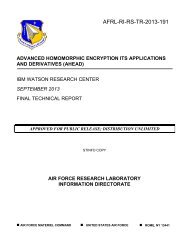EN100-web
EN100-web
EN100-web
Create successful ePaper yourself
Turn your PDF publications into a flip-book with our unique Google optimized e-Paper software.
Joint ERCIM Actions<br />
• The EU should support the creation of big data analytics<br />
centres accessible to researchers, public administrations,<br />
and medium and small companies.<br />
• Funding and supporting the development of the technologies<br />
needed to empower citizens, public institutions and<br />
businesses based on the values of the Federated Trusted<br />
Open Analytical Platforms for Knowledge Acceleration.<br />
• Promoting the development of a normative framework for<br />
the above mentioned empowering of citizens, public institutions<br />
and businesses along four dimensions: privacypreservation,<br />
trust management, individual empowerment<br />
and public good.<br />
• Promoting education of novel data scientists and ‘datacy’.<br />
• Promoting incentives for providing data access to<br />
researchers, businesses and public administrations. Examples<br />
include: assigning rewards to and/or facilitating virtuous<br />
business actors that share and maintain open data portals;<br />
giving value to ‘data citation’ in research, i.e. recognizing<br />
the citations to a data collection as a valid bibliometrics<br />
indicator; and enforcing regulations.<br />
Organization and methodology<br />
A group of twenty researchers from the areas of core database<br />
technology and data analytics met in Pisa, Italy in May<br />
2014 to discuss the state of research in these areas in the<br />
context of big data, its impact on practice or education, and<br />
important new directions. The attendees represented a broad<br />
cross-section of interests, affiliations, seniority, and geography.<br />
Before the workshop, each participant submitted a short<br />
paper, to be shared among participants, summarizing his/her<br />
vision of big data analytics over the next 10 years. During<br />
the workshop two subgroups were formed: one focused<br />
mainly on data management issues introduced by big data<br />
and the other on the new analytical opportunities opened by<br />
big data. The two groups alternated between separate meetings/brainstorming<br />
sessions and plenary meetings to share<br />
results and keep the overall efforts focused. The workshop<br />
terminated with the collaborative preparation of a declaration<br />
of aims and an index of context that were later<br />
expanded into the present paper.<br />
Link:<br />
The White Paper is available for download at<br />
http://www.ercim.eu/images/stories/pub/white-paper-Big-<br />
DataAnalytics.pdf<br />
Please contact:<br />
Mirco Nanni, ISTI-CNR,<br />
Tel: +39 050 6212843<br />
E-mail: mirco.nanni@isti.cnr.it<br />
ERCIM White Paper<br />
Cyber-Security and Privacy<br />
Editors: Javier Lopez, Fabio Martinelli and Pierangela<br />
Samarati<br />
Cyber-security and privacy are very active areas of<br />
research, and experts in this field are in growing<br />
demand by companies. Research in this area is highly<br />
relevant in today’s world - many aspects of our daily life<br />
depend on ICT - from mobile phones (more than one<br />
billion devices currently have the same operating<br />
system), computers in offices and programmable<br />
machines in factories, and intelligent surveillance<br />
cameras contributing to our safety (and infringing on<br />
our privacy). The pervasiveness of ICT increases the<br />
potential attack surface available to attackers,<br />
expanding the opportunities and potential for damage.<br />
Both the number of attackers and motivations for<br />
attacks are on the increase, indicating that cybersecurity<br />
attacks can be a prosperous business.<br />
Cyber-security is a long-standing research topic with many<br />
success stories represented in the literature and in the<br />
industry standards and products. Yet, cyber-attacks are<br />
increasing and their impacts becoming increasingly significant.<br />
There is no doubt that this is related to the expansion of<br />
the role of ICT and the fact that threats evolve along with<br />
technology.<br />
Cyber-attacks receive regular media coverage, thus raising<br />
awareness and concern about the issue within society. The<br />
protection of personal information is also a key concern.<br />
Many consider this to be a lost battle already, since most of<br />
our everyday life can be monitored by private companies (in<br />
addition to states). It should not be necessary, however, to<br />
forgo one’s privacy in order to enjoy technology. Work is<br />
needed to enable users to benefit from technological<br />
advances without compromising on privacy. Technological<br />
solutions should be developed to empower users with full<br />
control over their own data as well as to provide technological<br />
support to assist in regulating the protection of data.<br />
This document identifies research areas that could provide<br />
significant contributions to reduce cyber-insecurity and<br />
where ERCIM Institutions have significant research and<br />
innovation capabilities able to drive cooperative research<br />
efforts in the field. The following areas were identified:<br />
system security; security engineering; security operation<br />
management; data protection; security and big data; access<br />
control; quantitative aspects of security; practical and usable<br />
security; cryptography; trust management systems; digital<br />
freedom; network security.<br />
In particular, we make the following recommendations for<br />
research activities in cyber security and privacy:<br />
• Research activities are necessary in the area of system<br />
security in particular related to malware detection and protection<br />
as well as to security and privacy aspects of social<br />
networks.<br />
• Another relevant area for security is related to the secure<br />
engineering processes and methodologies. Significant<br />
10<br />
ERCIM NEWS 100 January 2015



